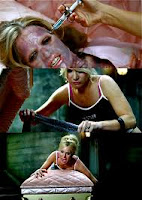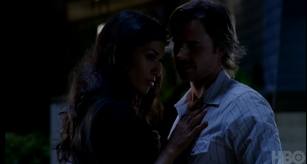In 2013 we intend to keep the metaphorical drinks flowing here, and what better way to start than to put the time we've had to reflect on Season 5 of True Blood in its entirety to good use?
While it certainly was never our intention to go a whole season without offering commentary, I must admit that watching S5 straight through gave us quite a different vantage point from which to view the show than during seasons past when we posted on each discrete episode. This past year, we were able to take in True Blood from a more holistic perspective, noticing themes that stretched across and unified the arc of the season that perhaps we wouldn't have had we been commenting on each episode right after it aired.
So, in the spirit of a retrospective we'd like to offer some of our thoughts on Season 5 and its greatest hits, misses, and the overarching themes we noticed, starting with Episode 1, Turn! Turn! Turn!
During this premiere episode, our favorite Bon Temps denizens seemed to be adjusting to some new realities. And, as the Biblical verse this title is drawn from suggests, there is a time and a place for everything. Here's a bit of a recap:
Bill and Eric were coping rather differently to Sookie's rejection...
(while on hands and knees scrubbing Nan Flanagan's splattered remains off King Bill's office floor)
....looking up, intensely concerned in response to what he senses as Sookie's distress at Tara's shooting, Bill exclaims, "Sookie!"
Eric: "Fuck Sookie...Did you not hear her tonight? She rejected us both".
Lafayatte and Sookie are facing the possibility of losing Tara, as she lies lifeless in a pool of blood on Sookie's kitchen floor, having taken a bullet for Sookie at Debbie Pelt's hands. Now, remember, Lafayette had just lost Jesus - having stabbed him to death while possessed by Marnie's spirit the day before.
Unable to face the prospect of losing another dear one, Lafayette begs Pam, who had just happened by since she was apparently making the rounds of anywhere Eric might be desperately looking for him since their falling out, to "turn" Tara for them.
Pam: "Turn her, I don't even like her!"
Sookie is incredulous, and at first can't accept this as the right course of action.
Lafayette: "Bitch, she took a bullet for you, you gonna deny her another chance?"
Pam begins to see how this proposition may work in her favor, and bargains with Sookie for her to use her "magic hands or super snatch" (interesting way to ascribe Sookie's value to isolated functional/sexual body parts!) to "fix what's broken" between she and her maker.
Sookie agrees to owe Pam one, thus putting in motion a series of events that will ultimately lead to a very different reality for Tara, one not of her own choosing but which she must deal with the fallout of.
Here, we see the emergence of a theme of Season 5: CHOICES
Meanwhile, outside Jason's house, Reverend Newlin has made his reappearance and is dealing with some dramatically different realities of his own!
Steve: "I woke up in a hole in the ground with a strange women who didn't tell me anything...didn't even give me her name".
You guessed it folks, Steve came back a vamp, without his followers, who he now characterizes as "People I trained to kill folks like me", his maker, or even his wife Sarah to turn to for support, reassurance, or guidance.
Now, only in his transformed state, can Steve Newlin admit...
Steve: "I'm a gay vampire American...and I love you Jason Stackhouse".
Steve does imply, somewhat disturbingly, that his repressed homosexuality and unrequited longing for Jason is what led him to act "all murderous and whatnot". Let's think about this for a second. We know that one of the criticisms leveled at the show is that if the vampire rights movement is an allegory for the gay rights movement (a far too reductionist analysis of the show IMHO), then by framing vampires as stand-ins for the LBGT community, True Blood is essentially saying that LGBT folks are violent, antisocial monsters. Can we simply construe Steve's admission as a device, albeit taken to the extreme, for exploring the destructive effects of denying one's sexuality and identity? Or can his declaration be seen as fuel for the aforementioned critique? I hope some of you out there will weigh in on this!
Jason, bewildered and naked except for the blanket Steve strategically draped over him while he was still glamoured, had quite a different response than one might expect from a typical, heterosexual "vain-ass, body-conscious ex-
Steve looks pleased at first but can't take it when Jason let's him know, "this dog...just don't bark that way".
Right before Steve, in a fit of exasperation, frustration, rage, and lust, sinks his fangs into an unwilling ans struggling Jason, Jessica bursts through the door and with an unmistakable air of new found confidence and comfort in her own skin as both woman and vampire, declares herself the older (and therefore more powerful) vampire, and utters those potent words, "Jason is mine". With his invitation swiftly revoked, Steve is run off. But not before he can get in one more, "I love you" before he's sucked out the door.
Her self-assurance and confident sexuality palpable, Jessica initiates sex with the still bound and naked Jason...only now, he's much more willing.
And that's not even the halfway mark of the episode!
Over the course of Turn! Turn! Turn!, we are confronted with a host of other new realities, as well as issues and themes that prove to be recurring throughout S5, from the political factions and hierarchies of the werewolf pack and vampire authority, self-sacrifice in the persons of Sam Merlotte and vampires Nora and Eric...and Pam ;) to the sexual politics of hook-ups between so-called vampire siblings and waitress-sheriff couplings, choices involving when to pull the trigger and when to lie, whether or not to let your past into your present (if it can be held at bay), and how one's past influences the person one is today.
We have entree to the very real issues of wartime trauma and recovery which couldn't be more timely as veterans of the Iraq and Afghanistan conflict are arriving home in greater numbers in the story arc of Terry, Patrick, and Arlene that launches during this episode.
And, in Lafayette, we are faced with the heaviness of grief and regret in a way that is startlingly true-to-life, human, and so very relatable.
We've also got the very human desires to be liked and accepted playing out in the friendship-kinship-belonging plot lines that touch many characters as part of this episode.
This leads us to the question, "can men and women ever just be friends", or perhaps, "can men and women's relationships ever NOT be sexualized" that reverberates across a few story arcs this season, beginning in episode 1 with Jason and Jessica, Eric and Nora.
I'll be back in the next post to discuss some of my observations along those lines!
~Rachel

























